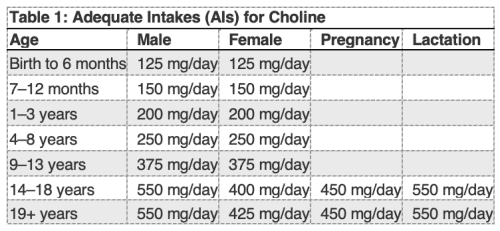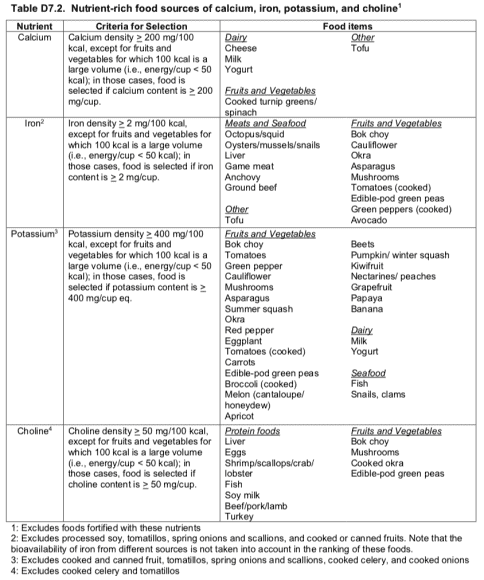WHY IS CHOLINE IMPORTANT?
Choline is an essential nutrient, meaning that we must consume adequate amounts in the diet to achieve optimal health. Unfortunately, most people do not consume enough choline. In fact, more than 90% of Americans (including approximately 90% of pregnant women) fail to meet the adequate intake.1 The Dietary Guidelines Advisory Committee has classified choline as a nutrient that poses special challenges for Americans due to underconsumption and encouraged eggs for pregnant women, as a complementary food for babies and toddlers, and for pre-teens and adolescents.2 Many foods offer choline in small amounts, however, only a few foods are significant choline sources. Furthermore, most multivitamin supplements contain little, if any, choline. Fortunately, eggs are convenient, affordable, accessible, and an excellent source of choline.
Beginning in fetal development, Choline is critical to good health and remains essential throughout the lifespan. This nutrient is important in many ways.
- During pregnancy, choline helps the baby’s brain and spinal cord develop properly and supports brain health throughout life.
- Infants and young children need choline for continued brain development and health.
- Choline is part of a neurotransmitter called acetylcholine, which is important for muscle control, memory and mood.3
- Choline is also important for the support of membranes that surround your cells, the transportation of fats throughout the body and for liver health.
- New research is exploring how choline throughout life may have lasting effects on cognition and prevention of cognitive decline.4
HOW MUCH CHOLINE DO WE NEED?
The amount of choline an individual needs depends on many things, including age, gender and stage of life. Table 1 lists the current Adequate Intakes (AIs) for choline.3

WHAT FOODS HAVE CHOLINE?
People of all ages need adequate choline for good health, but very few consume enough through food and supplements. While many foods contain some choline, only a handful of foods are considered good or excellent sources. Fortunately, two large eggs (about 300mg of choline) contain more than half of the recommended intake for pregnant women and can help them meet their needs. The table below lists food sources of choline.2

CHOLINE & COGNITION
Choline plays a role in early brain development during pregnancy and infancy. There is evidence that infants exposed to higher levels of maternal choline (930 mg/day) during the third trimester have improved information processing speed, an indicator of cognitive function,4,5 during the first year of life.
The American Medical Association (AMA) House of Delegates recommended the addition of choline to prenatal vitamins because of its essentiality in promoting cognitive development of the offspring.6 This recommendation from AMA highlights the increased recognition of choline as a nutrient of concern. The 2015-2020 Dietary Guidelines for Americans (DGAs) also list choline as a nutrient under consumed by most Americans. The DGAs recommend individuals shift to healthier eating patterns to help meet nutrient needs, including choline.7
Interested in more information about choline?
- Read: Choline – The Underconsumed and Underappreciated Essential Nutrient
- Handout: Important Nutrients for Brain Health
- Watch: Brain Health
- Read: Research News – Choline, Lutein, and Cognition
- Watch: Jessica Ivey on WBRC Fox 6 News
- Recipe: Sweet and Savory Breakfast Bowl by Mary Ellen Phipps, RD
- Watch: Mind Your Eggs + Veggies: Nutrition for Cognitive Health webinar
References
- Wallace TC, Fulgoni VL III. Assessment of total choline intakes in the United States. J Am Coll Nutr 2016, 35(2), 108-112.
- National Institutes of Health. Fact Sheet for Health Professionals: Choline. Version current 26 September 2018. ods.od.nih.gov/factsheets/Choline-HealthProfessional/Accessed June 22, 2020.
- Wallace TC. A comprehensive review of eggs, choline, and lutein on cognition across the life-span. J Am Coll Nutr 2018, 37(4), 269-285.
- Caudill MA, et al. Maternal choline supplementation during the third trimester of pregnancy improves infant information processing speed: a randomized, double-blind, controlled feeding study. FASEB J. 2018;32:2172-2180.
- AMA Wire. AMA backs global health experts in calling infertility a disease. https://wire.ama-assn.org/ama-news/ama-backs-global-health-experts-calling-infertility-disease
- U.S. Department of Health and Human Services and U.S. Department of Agriculture. 2015 – 2020 Dietary Guidelines for Americans. 8th Edition. December 2015. Available at http://health.gov/dietaryguidelines/2015/guidelines/.

